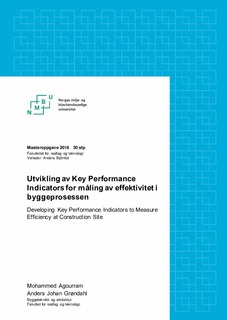| dc.contributor.advisor | Björnfot, Anders | |
| dc.contributor.advisor | Bakke, Henrik | |
| dc.contributor.advisor | Børstad, Øyvind | |
| dc.contributor.author | Agourram, Mohammed | |
| dc.contributor.author | Grøndahl, Anders Johan | |
| dc.date.accessioned | 2019-02-12T13:13:23Z | |
| dc.date.available | 2019-02-12T13:13:23Z | |
| dc.date.issued | 2018 | |
| dc.identifier.uri | http://hdl.handle.net/11250/2585042 | |
| dc.description.abstract | Stadig flere bedrifteri byggebransjen implementerer Lean-filosofien i deres driftsstrategi. Ved fokus på kontinuerlig forbedring, bedre flyt og mindre sløsing i produksjonskjeden, benyttes Last Planner System(LPS) som planleggingsmetodikk. I Lean-filosofien fremheves arbeidsflyt som nøkkelen til en effektiv byggeprosess. At arbeid utføres i riktig rekkefølge, med god planlegging, uten vesentlig venting og sløsing er sentralt for filosofien. For å sikre kontinuerlig forbedring og effektivitet i byggeprosessen, er det viktig at de involverte vet hva som kan forbedres og effekten av tiltakene som iverksettes. Dette kan belyses ved å utvikle Key Performance Indicators(KPI).
Key Performance Indicators kan sees på som viktige nøkkeltall forevaluering av måloppnåelse, og forenkler på mange måter det totale bildet av bedriftens prestasjonsevne. I produksjonsfasen øker fokuset på kvalitetsstyring, der håndtering og forebygging av avvik står sentral.God planlegging og dokumentering underveis i produksjonsfasen gjør det mulig å vurdere effektiviteten i arbeidet på byggeplassen gjennom bruk av KPI-er.Hensikten med denne masteroppgaven er derfor å belyse hvilke KPI-er som kan utvikles for å sikre effektiv bygging, samt bidra til kontinuerlig forbedring i produksjonsfasen. | nb_NO |
| dc.description.abstract | More and more companies in the construction industry implement the Lean-philosophy in their operational strategy. Focusing on continuousimprovement, better flow and less waste in the production chain, the Last Planner System (LPS) as a planning methodology is used. In the Leanphilosophy, workflow is put forward as the key for an efficient construction process. Construction being done in the right order, with good planning, without any significant delay or waste is central for this philosophy. To ensure continuousimprovement and efficiency in the construction process, it is essential to know what can be improved and the effect of any changes made. In order to find this out is to develop Key Performance Indicators (KPI).
Key Performance Indicators can be seen on as important numbers for the evaluation of reaching goals, in many ways it simplifies the view on the performance of a company. In the phase of production, focus is on quality control where prevention of any deviation from the standard is central. Adequate planning and documentation throughout the production phase enables the evaluation of the efficiency of the construction through use of KPI’s. This Masterthesis intends to illuminate which KPI’s that can be developed to ensure efficient construction and contribute to continuousimprovement in the production phase. | nb_NO |
| dc.language.iso | nob | nb_NO |
| dc.publisher | Norwegian University of Life Sciences, Ås | nb_NO |
| dc.rights | Attribution-NonCommercial-NoDerivatives 4.0 Internasjonal | * |
| dc.rights.uri | http://creativecommons.org/licenses/by-nc-nd/4.0/deed.no | * |
| dc.title | Utvikling av Key Performance Indicators for måling av effektivitet i byggeprosessen | nb_NO |
| dc.title.alternative | Developing Key Performance Indicators to measure efficiency at construction site | nb_NO |
| dc.type | Master thesis | nb_NO |
| dc.description.version | publishedVersion | nb_NO |
| dc.subject.nsi | VDP::Teknologi: 500 | nb_NO |
| dc.description.localcode | M-BA | nb_NO |

